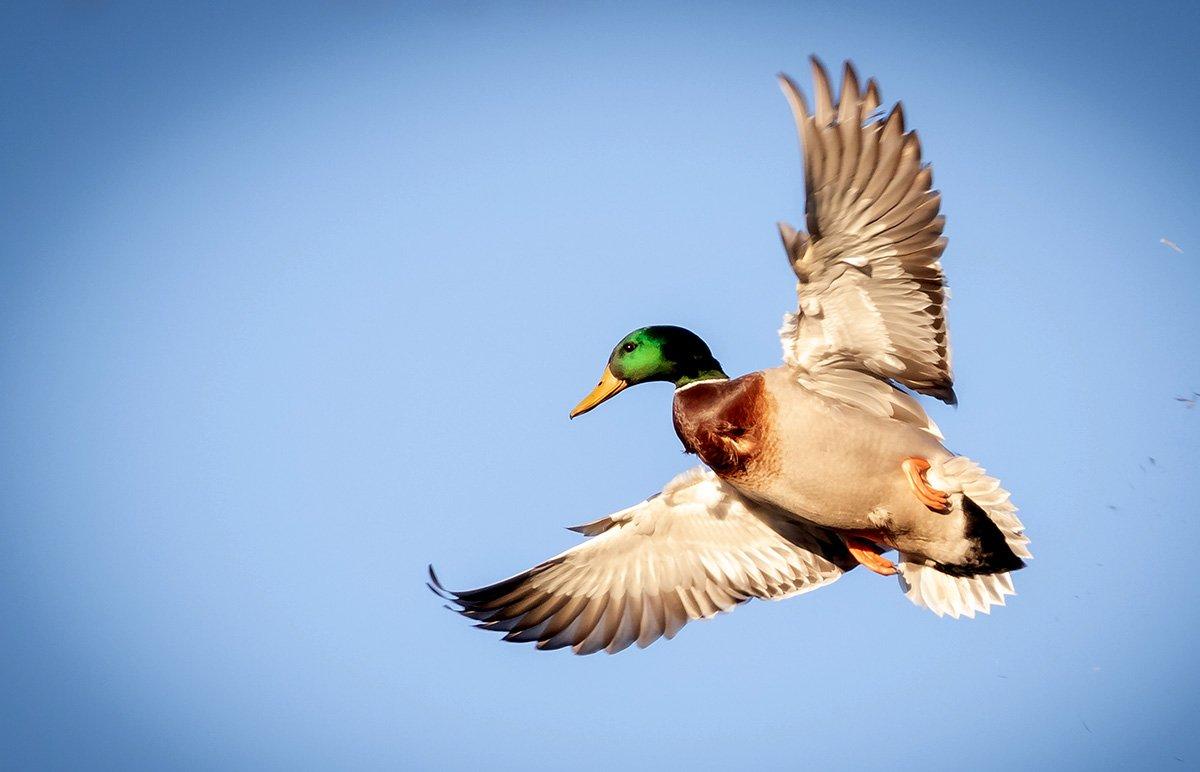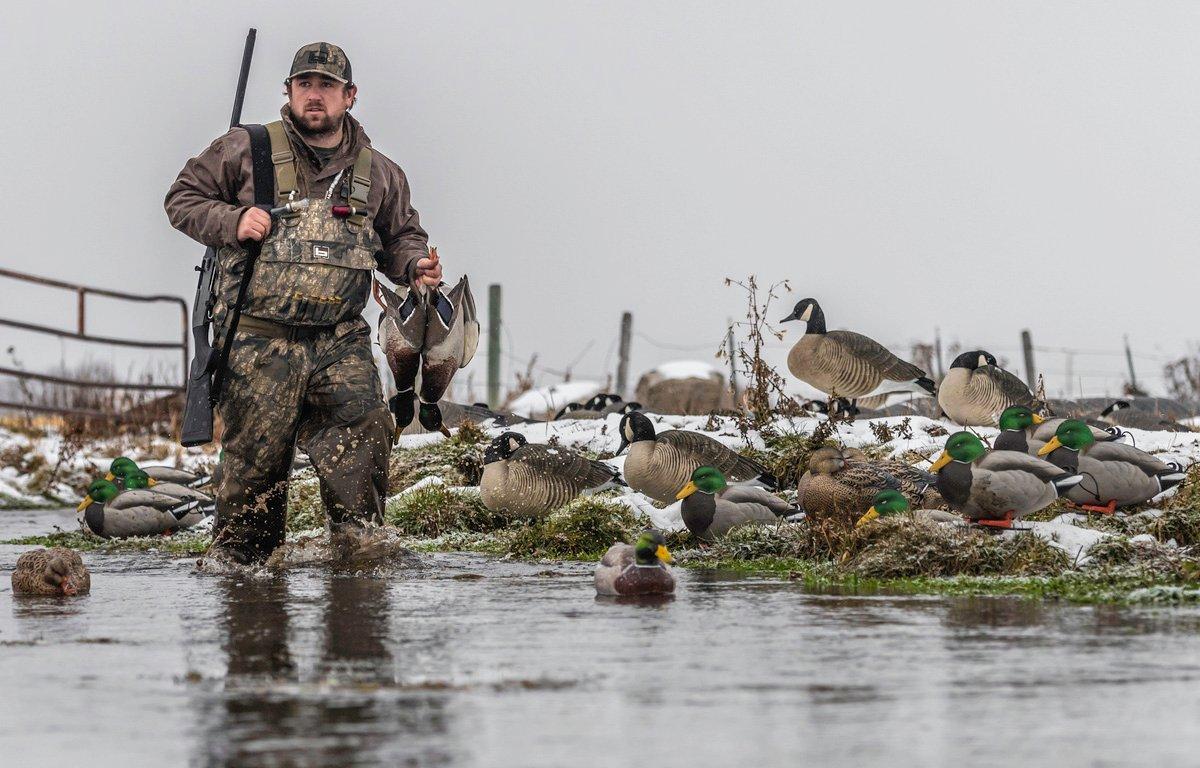A few dedicated souls will skip deer season to hunt waterfowl. The author might know why
Scientists have never identified a duck hunting gene, but if they do, I'm guessing the chromosome carrying that information will be a bit crooked. That might be the only plausible explanation for the ways duck and goose specialists differ from other hunters. Because, let's face it: Hardcore waterfowlers are a bit odd.
Many folks in the United States — about 1 million, by the last estimate — hunt waterfowl. Many of those people also hunt other game, and if you conducted a survey, you'd probably find out that most active waterfowl hunters spend more time pursuing whitetails, small game and possibly spring gobblers. Further, many more hunters specialize exclusively in deer and turkeys. That shouldn't surprise anyone, as whitetails are North America's No. 1 game animal, and pursuing them holds undeniable appeal. That also holds true, to a lesser extent, with America's bird, the turkey.
But in a dark corner of the sporting world lurks a small cadre of rebels; guys and gals who specialize in hunting ducks and geese even if that means — gasp! — sacrificing time in the deer woods.
Let's face it: Hardcore waterfowlers are a bit odd.
To many, this is difficult to understand. It seems counterintuitive to work your tail off, often during dreadful weather, to chase birds when you could just be normal and sit in a treestand for a few hours. Even the work/reward ratio seems lopsided. A whitetail guy lives a year-round lifestyle, sure: setting stands, checking trail cameras, planting and managing food plots and regularly shooting his bow. But he might also spend a few pleasant mornings and afternoons in a stand and come away with a good buck that will provide dozens of pounds of meat, and if not, at least a doe.
A duck nut also follows a dedicated life, but his consists of decoy maintenance, dog training, round after round of clay targets, hundreds of miles driven scouting and constant ear-splitting practice with calls. Then the season begins, and the work really starts. Every early morning brings a long slog lugging loads of gear or a frigid boat ride in the dark. This transitions into setting decoys, brushing in blinds and seemingly endless hours of staring at the sky. At the end of each hunt, these tasks begin again in reverse, and just when you think you're finally done, you must scout for the next day before you can squeeze in a few hours of sleep and start all over again. And even on the best days, you'll collect just a few pounds of meat.
So I can see how you might wonder: Why?
Ducky Roots
Like many Midwestern kids of my generation, I grew up hunting squirrels, rabbits, ducks, geese, grouse, pheasants and whitetails. But about 35 years ago, I began focusing on waterfowl more than deer, even though duck seasons during those formative years were only 30 days, with a three-duck limit, because of drought on the prairies. By the time liberal season formats rolled around in the Mississippi Flyway (40 days in 1994, 50 in 1995 and '96, and 60 from 1997 until now — but who's keeping track?) my transformation was complete. I hunted deer for a few days during gun season. Otherwise, ducks and geese ruled my days from Sept. 1 through early December. Thankfully, spring gobbler season didn't conflict with my waterfowl obsession.
Initially, my transformation into a waterfowl specialist was easy to explain. My college campus was just a few blocks from a large lake that attracts thousands of migrating ducks. Further, I hunted with a friend who had a blind on that lake, and it was easy to sneak away a few times per week before class and shoot some ducks. It was far more difficult to find quality deer hunting. As the years passed, my buddies and I increasingly focused on waterfowl. It became our thing and remains so today.
Of course, other friends poked fun at my duck-first mentality, and many wondered aloud why I'd chosen this path. I'd usually reply that everyone has his or her own thing, and that I'd simply fallen into waterfowling. When pressed, I might mumble that I enjoyed time in the environs waterfowl frequent and revered the unique skill set duck and goose hunting demands: calling, wing-shooting, boat handling and physical and mental toughness. Perhaps I'd blurt out something about the variety waterfowling provides, from tiny teal and speedy divers to fat mallards and giant honkers.
But it goes deeper, and I'm guessing I'm not alone.
It's About the Birds
Ultimately, waterfowl hunting is about the birds and their nature. Pursuing them lets me witness firsthand, and be a small participant in, the annual autumn migration, a natural process that began many millennia before my ancestors reached North America — even long before Homo sapiens evolved. That process remains more mystery than fact. Despite modern science and the incredible sum of human knowledge, we still can't fully explain or completely understand waterfowl migrations. And to be a small part of that each fall is beyond compare.
Every snippet of the process amazes me, demanding that I savor the moment before it passes. A muggy September morning pursuing local geese holds as much thrill as a December afternoon chasing hardy mallards on a small creek. And a flock of prairie gadwall sweeping across a flooded bean field spikes my heart rate just like a squadron of bluebills battling wind and waves on my home water.
I'd never contend that waterfowl hunting is superior to another outdoor pursuit, and I have no interest in debating the relative difficulty of hunting each species. Duck and goose hunting, with its painted skies and mystical sounds, drew me in long ago, and I'll stay there. It will always be ducks for a few like-minded oddballs and me.
Someday, I might understand the vagaries of migration and fully grasp the significance of taking a bird that spent the previous day on a marsh hundreds of miles away. But for now, I'm content to watch the show unwind, realizing that every fall is a unique play that's meant to be enjoyed on its own merit. Because missing the spectacle is out of the question.
Click here for more Realtree waterfowl hunting content. And check us out on Facebook.









